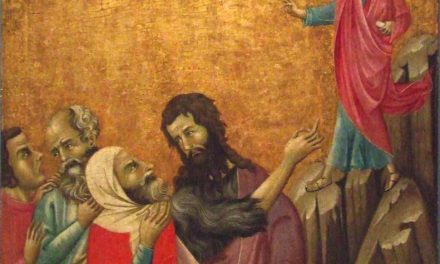Fourth Sunday in Ordinary Time – The Nature and Ethics of a Prophet
JER 1:4-5, 17-19; PS 71:1-2, 3-4, 5-6, 15-17; 1 COR 12:31—13:13; LK 4:21-30
As I was preparing for confirmation in junior high, I remember a one-on-one conversation with a religious sister from my parish. She asked which of the Beatitudes was my favorite. Without missing a beat, I replied: “Blessed are those who are persecuted for righteousness’ sake, for theirs is the kingdom of heaven.” The subsequent verse from Matthew 5 explains further what I had in mind: “Blessed are you when people revile you and persecute you and utter all kinds of evil against you falsely on my account. Rejoice and be glad, for your reward is great in heaven, for in the same way they persecuted the prophets who were before you.”
There was, of course, a lot of naivete and inexperience in the response I gave. But I recognize in my adolescent self a reality of human nature. There is an odd kind of joy found in our rejection because it can suggest that we are persecuted for our righteousness. The more we are opposed and despised, the more convinced we are that we are fighting on behalf of truth and justice. I found myself charmed by this invitation to sacrifice and its surfeit of meaning. When I faced ridicule or hostility, I would know that I was speaking on God’s behalf. This was the path of the prophet.
But is it? Or at least, is it to be reduced to that?
In this Sunday’s readings, we are given the opportunity to reflect on the nature of the prophet. As difficult as it may be to willingly endure persecution, the readings suggest that the prophetic task is even more difficult. The prophet must be defined by love, not by the suffering and the sacrifices.
While it is hard to read 1 Corinthians 12:31-13:13 without thinking of a wedding liturgy, the images seem more prophetic than nuptial: “If I speak in human and angelic tongues,” “if I have the gift of prophecy,” “if I give away everything I own, and if I hand my body over.” The point is that all of these possibilities amount to nothing without love. And love sets a high bar. It means the prophet cannot be “pompous” or “inflated.” The prophet cannot be “quick-tempered.” And the prophet “does not rejoice over wrongdoing but rejoices with the truth.”
This latter warning is especially crucial. What is the source of the prophet’s joy in the midst of her potential suffering? Or put another way, can the prophet desire persecution?
The answer must be no. The prophet can (and presumably should) be willing to endure persecution, but such suffering must not be the source of his joy. To be treated unfairly, even maliciously, means that there are those who are acting unjustly and perhaps with malice. To desire persecution, then, is to desire the sin of one’s brothers and sisters.
This is where the demand for love becomes so significant for understanding the contours of the prophetic role. Love is concerned with union. The prophet – even when proclaiming difficult truths – must be united in love with those being addressed. And love cannot desire that others act unjustly. It recalls in a way the insight of St. Thomas Aquinas when he addresses the topic of war under the virtue of charity in the Summa Theologiae. While conflict may appear to be the dominant reality, any moral legitimacy requires that the fundamental narrative must actually be one of union and love.
When you are a voice for justice and intend to speak God’s truth (at least, your most honest understanding of it), the realist must anticipate rejection and resistance. Anticipation and desire are not identical, however. It simply cannot be the case that the prophet – to be a prophet – requires the existence of persecutors. As a result, the prophet cannot be defined by rejection and suffering, likely as they may be. 1 Corinthians suggests that the prophet is defined by love – a union not only with truth but with those who are called to recognize that truth.
It is interesting to see the violent reaction to Jesus in the Gospel reading when he claims his prophetic role. We are told that his hearers in the synagogue were filled with fury and drove him out of the town to hurl him over the hill. Jesus asserted that “no prophet is accepted in his own native place.” The subsequent examples he offered were of prophets who were embraced only by those beyond the boundaries of Israel. Some scriptural commentary suggests that what angered his listeners was the notion that the prophet would come for all people (i.e. not only Israel).
Yet, of course the prophet’s task is not to reinforce boundaries. The prophet ought to be a mouthpiece for union – even when speaking difficult truth. For the listeners in the synagogue, the difficult truth mayhave been this very call to union with the “other.”
In our times, as in all times, there is a great need for prophets. From campus protests to presidential politics, we need to hear from those who would speak for justice even when it is not what many others desire to hear. But the true test of the prophet is not whether she can endure the backlash that likely awaits. It is whether he can remain in loving union with those who would ridicule and reject. Thus, we find on the cross the prophet par excellence – not because he was crucified but because he loved and prayed for others through the crucifixion.




